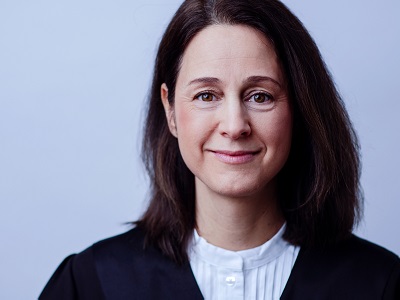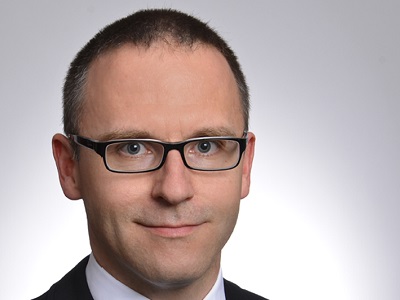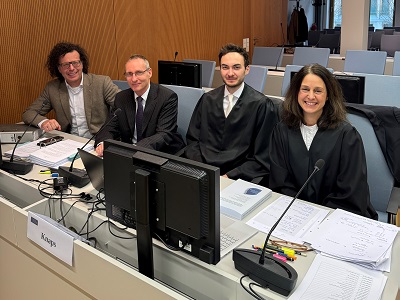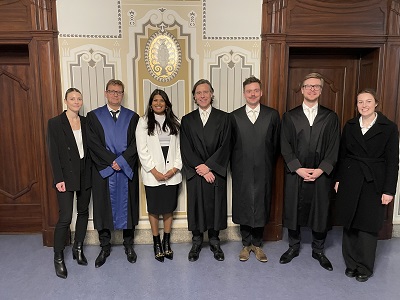Düsseldorf local division hears first proceedings over avalanche rescue devices
Following the issue of an ex-parte PI in December, the UPC dispute between Ortovox and Mammut has entered the next stage. On 5 March, the international court's local division in Düsseldorf heard the case between the two parties, which was also the first held in public in the city. In the courtroom, however, the two sports equipment companies gave no quarter.
8 March 2024 by Mathieu Klos
At 167 meters above sea level, the Sandberg is the highest elevation in Düsseldorf. Snow is the exception rather than the rule in the mild Rhineland, in the heart of which Düsseldorf lies. Nevertheless, the city’s UPC local division heard a case on Tuesday concerning a German and Austrian sales ban for Mammut’s Barryvox S2 avalanche search device.
Avalanche of litigation
The sales ban has been in place since December. At the request of patent holder Ortovox, the Düsseldorf local division had prohibited Mammut from selling a new version of its Barryvox avalanche search device via an ex-parte PI (case ID: ACT_589655/2023)
Mammut had previously presented the new devices in its Barryvox series at the ISPO sports trade fair in Munich. However, Ortovox believes the new model infringed EP 3 466 498, which protects a search device, and a method of operation, for avalanche victims. Ortovox enforced the judgment directly against a security deposit of €500,000.
The Düsseldorf local division, headed by presiding judge Ronny Thomas, was tasked with reviewing this order. Mammut, which was unable to defend itself in December’s ex-parte proceedings, issued the request. The Swiss sports outfitter quickly organised its defence around the Christmas period, instructing Bird & Bird partner Oliver Jüngst and Basel patent attorney Fabian Leimgruber from ThomannFischer.
Old acquaintances
Düsseldorf has a long tradition of complex patent cases. In particular, medium-sized companies such as Ortovox file lawsuits here for mechanics or physics patents. Parties considered the Düsseldorf UPC division attractive for PIs at an early stage, since it issued an ex-parte PI against Revolt Zycling in June at the request of MyStromer.
Bavarian sporting goods manufacturer Ortovox is thus likely to have once again opted for Düsseldorf rather than the much-closer Munich local division. In fact, it already sued Mammut here over a German patent: Düsseldorf Higher Regional Court upheld the suit in October 2010 (case ID: Az. I-2 U 42/09).

Miriam Kiefer
In the courtroom, Ortovox lawyer Miriam Kiefer, partner at Kather Augenstein, explained that the companies settled this dispute shortly after, to avoid costly proceedings over costs and damages. Kiefer also represented Ortovox in this 2010 dispute before Düsseldorf Higher Regional Court.
Now, 14 years on, patent attorney Michael Siebel provides support. His law firm Hofstetter Schurack has filed patents for Ortovox for years. But it turns out that the previous settlement will play an important role during the course of the day’s UPC proceedings.
Düsseldorf’s first UPC hearing
The hearing was a historic moment for the city’s local UPC division. It was the first time the court has heard main proceedings and in the presence of the public.
Court staff were suitably tense. Everything had to run perfectly. The government of North Rhine-Westphalia had set up a state-of-the-art courtroom in the city’s higher regional court, especially for the UPC. Now, for the very first time, it was being used as an international patent court.
On the day, a fresh breeze was blowing through the time-honoured court building near the banks of the Rhine river. Staff checked the IT system one last time before the trial began. Presumably for the first time in the courthouse’s history, the trial was digitally recorded. The court set up wifi access for the parties, while name badges adorned the seats of lawyers and judges.

Ronny Thomas
Presiding judge Ronny Thomas warmly welcomed the party representatives and the gallery. Two patent attorneys from Düsseldorf, whom the UPC has appointed as technically qualified judges, are sat in the audience. Although having nothing to do with the case itself, they are “here to learn”.
Erwin Wismeth, who is also a judge at the German Federal Patent Court, is the Mammut vs. Ortovox technical judge.
PI on the table
Ronny Thomas gave a detailed introduction, going into detail about the likelihood that the court might not uphold the patent-in-suit, EP 498, after all.
A few weeks previous, the UPC Court of Appeal set clear guidelines on how to deal with validity of the patent-in-suit in UPC PI proceedings after it overturned a PI from the Munich local division in the dispute between 10X Genomics and NanoString.
Ortovox’s EP 498 is a bundle patent valid in Germany, Austria and Switzerland, with the company producing and selling its own search devices based on the patent. Nullity proceedings against the Swiss part of the patent are currently pending at the Federal Patent Court in St. Gallen. Mammut’s lawyer Oliver Jüngst will later explain that the party is already preparing a counterclaim of revocation against the patent, as part of the response to the main action.
Parallel to the PI proceedings, Ortovox had sued Mammut at the UPC for infringement of EP 498. If there is a high probability that the patent is not valid, the court would have to withdraw its PI order.
Of urgent interest
Thomas also addressed the urgency of the order. The court is particularly interested in Ortovox’s application to have part of the costs reimbursed in the ongoing proceedings, although the company only submitted this application after the PI ruling. Mammut thinks that this is too late.
However, the UPC rules do not clearly regulate how to proceed in such a case. The court, as yet, has no clear opinion on this matter, but the four judges certainly have a clear opinion on the core issue. They affirm the urgency of the ex-parte PI and consider the patent to be valid.
Now the Bird & Bird team, and the Swiss patent attorney Fabian Leimgruber, must now work hard.
New state of the art
Mammut and its attorneys had already introduced new prior art into the proceedings on Monday afternoon, just half a day before the oral hearing. Too late, argue the Ortovox lawyers, while the Mammut lawyers argued that the ex-parte proceedings meant they could not start researching earlier. They claimed the results only arrived on the Friday before the hearing, with the court then informed directly on Monday.
Lawyers argued Ortovox had applied earlier for a patent similar to EP 498. The patent specification for EP 1 577 679 A1 discloses prior art at an earlier date and is therefore prejudicial to novelty for EP 498. The probability that the court will now declare the patent-in-suit invalid in revocation proceedings has thus increased. The PI must therefore be withdrawn, according to the arguments of Mammut’s lawyers.
While, from Mammut’s point of view, EP 679 is a game changer in the dispute, from Ortovox’s point of view the patent is irrelevant. Mammut brought the patent into the proceedings too late. Furthermore, according to Ortovox, it is a completely different, outdated technology that has nothing to do with the new devices and EP 498. It says that the court should no longer consider EP 679 as an argument.
Moreover, says Ortovox, Mammut must have known about the existence of the patent specification. This is because it belongs to the patent family that already played a role before the Higher Regional Court Düsseldorf in 2010. As evidence, Miriam Kiefer now presents the court with the licence agreement between the two companies and the dispute picks up speed.
Compulsory licence on the table
The Mammut side is baffled: Jüngst explains that the in-house counsel present and their lawyers had no knowledge of the contract. None of those present were involved in the contract at the time. This revelation prompts the lawyer to go on the offensive. He reads the licence agreement in such a way that it also includes future conflicts over patents.
With the contract, Ortovox should not have applied for an ex-parte PI in the first place. Jüngst applies for a compulsory licence.

Ortovox representatives: Sebastian Meyer (Schwanhäußer Industrie Holding), Michael Siebel (Hofstetter Schurack), Robert Knaps, Miriam Kiefer (both Kather Augenstein) ©Kather Augenstein
Miriam Kiefer replies that Mammut as a company is well aware of the contract, and that the parties concluded it at the time to avoid high follow-up costs due to lawsuits over compensation.
Furthermore, according to Kiefer, the licence only includes the patent family of the German patent-in-suit at the time, which also includes EP 679. The agreement does not cover new patents.
Friendly exchange
With the main arguments now on the table, the court interrupts the hearing for a short break. Walter Schober, who is also the presiding judge of the local chamber in Vienna, uses the opportunity to persuade the parties to hold settlement talks.
However, neither side seriously considers this. When things resume, Miriam Kiefer once again briefly signals a willingness to talk in principle, but nothing more.
The parties exchange their final legal arguments and Ronny Thomas ends the hearing after three hours and a quarter. The court will announce the verdict on 9 April.
And relax. The parties breathe out; the judges are reluctant to leave the UPC courtroom at this historic time. They, along with the lawyers and the in-house representatives, exchange pleasantries. The judges allow observers to take final photos of the panel – a move which would be unthinkable at the regional and higher regional court.

Mammut representatives: Claudia Erbsmehl, Fabian Leimgruber (both ThomannFischer), Danushiya Greb (Mammut), Oliver Jüngst, Moritz Schröder, Alexander Bothe, Caroline Erhardt (all three Bird & Bird). ©Bird & Bird
There was even an astonishing amount of laughter in the courtroom, despite the harshness of the dispute. It seems the UPC, with its international panels, not only breaks with tradition. It makes many things possible.
A wealth of advisors
For Ortovox
Kather Augenstein (Düsseldorf): Miriam Kiefer (lead, partner); associate: Robert Knaps
Hofstetter Schurack (Munich): Michael Siebel (patent attorney)
In-house (Taufkirchen/Nuremberg): Fabian Kazmaier (head development and safety, Ortovox), Sebastian Meyer (head of legal, compliance and patents, Schwanhäußer Industrie Holding), Hansjörg Traub (head of patent, Schwanhäußer Industrie Holding)
For Mammut
Bird & Bird (Düsseldorf): Oliver Jüngst (lead, partner); counsel: Moritz Schröder; associate: Alexander Bothe
ThomannFischer (Basel): Fabian Leimgruber (patent attorney), Claudia Erbsmehl (lawyer admitted to the Swiss Bar)
In-house (Zurich): Danushiya Greb (general counsel, Mammut)
Unified Patent Court, Düsseldorf local division
Ronny Thomas (presiding judge), Berenice Thom, Walter Schober, Erwin Wismeth (TQJ)
